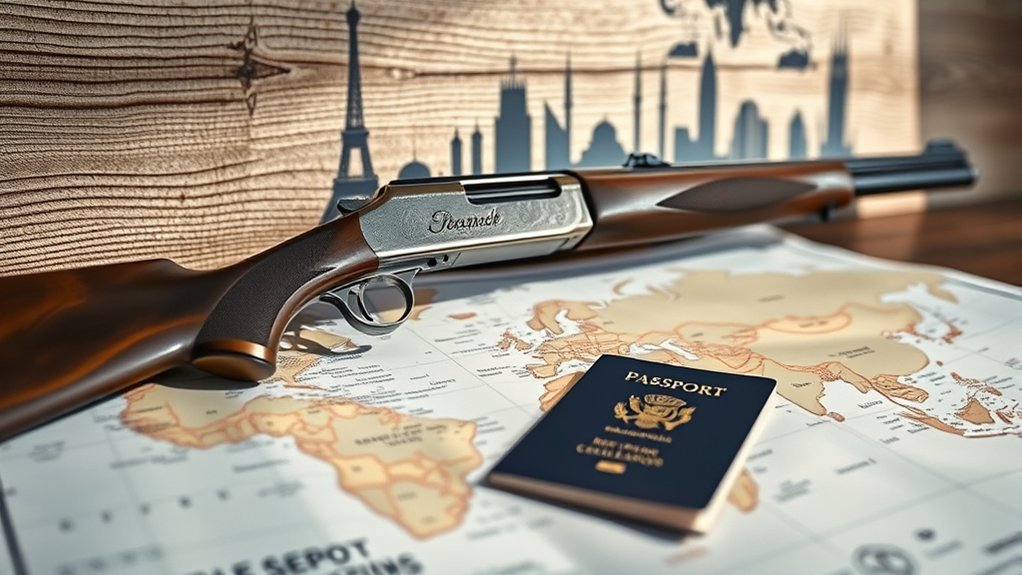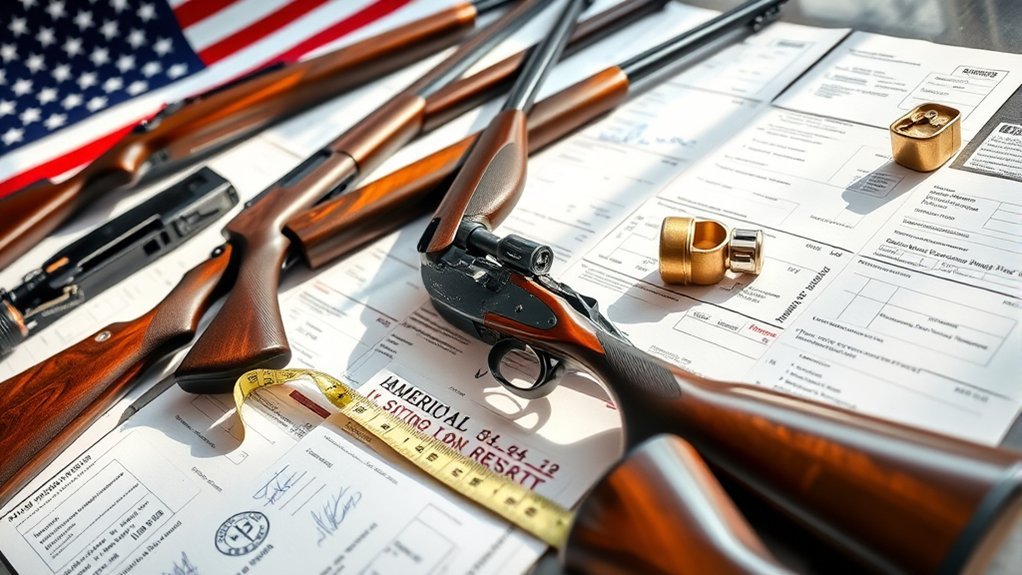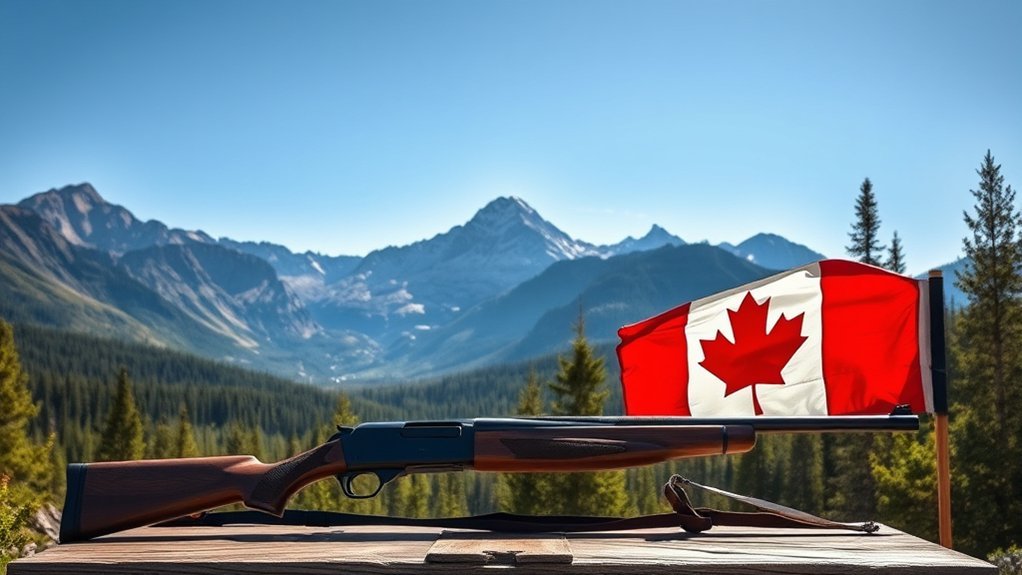When it comes to importing hunting rifles internationally, you need to navigate a complex web of regulations that vary by country. Each destination has its own set of requirements, from permits to customs documentation. Understanding these rules is vital to guarantee compliance and avoid potential penalties. However, the intricacies of these regulations can be overwhelming, making it important to grasp the specifics before you proceed. What challenges might you face in this process?
Overview of International Firearm Import Regulations

When considering the importation of hunting rifles, it is vital to understand that international firearm regulations vary substantially by country. Each nation has specific laws governing the importation, registration, and ownership of firearms. Some countries may require permits or licenses, while others impose outright bans. Additionally, documentation such as proof of purchase, import permits, and background checks might be necessary. It is important to research each destination’s regulations thoroughly, as penalties for non-compliance can be severe, including fines or confiscation of firearms. Furthermore, customs procedures can differ widely, affecting the ease of importation. Always consult official government sources or legal experts to guarantee that you’re fully informed and compliant with all requirements before attempting to import hunting rifles.
Importing Hunting Rifles to the United States

When you’re considering importing hunting rifles to the United States, it’s essential to understand the legal requirements that govern this process. You’ll need to gather specific documentation and permits to guarantee compliance with federal and state laws. Ignoring these details can lead to significant delays or even disqualification of your import.
Legal Requirements Overview
Importing hunting rifles into the United States involves traversing a complex web of legal requirements that guarantee compliance with federal and state regulations. First, you need to understand the Gun Control Act, which dictates who can import firearms and under what conditions. You must ascertain that the rifle is not classified as a prohibited weapon. Additionally, the Bureau of Alcohol, Tobacco, Firearms and Explosives (ATF) oversees the import process, requiring you to be a licensed importer. Each state may have specific laws regarding hunting rifles, so researching those is essential. Finally, verify you’re aware of any international agreements that might affect your import. Failing to meet these legal requirements can result in confiscation or legal penalties.
Documentation and Permits Needed
To successfully import hunting rifles into the United States, you’ll need to gather specific documentation and permits that comply with both federal and state regulations. First, obtain a valid import permit from the Bureau of Alcohol, Tobacco, Firearms and Explosives (ATF), typically through ATF Form 6. You’ll also need to provide proof of ownership, such as a bill of sale or previous registration documents. Additionally, ascertain compliance with the U.S. Customs and Border Protection (CBP) requirements by submitting a CBP Form 7501 for importation. Don’t forget to check your state’s specific regulations, as some may require further permits or documentation. Keeping all these documents organized and accurate will streamline your import process and avoid potential legal issues.
Import Rules for Canada

Although you may be keen to bring a hunting rifle into Canada, understanding the stringent import rules is essential to confirm compliance with Canadian law. First, ascertain your rifle is classified as a non-restricted firearm; otherwise, additional regulations apply. You’ll need to declare your rifle at the border and complete a Non-Resident Firearm Declaration form. Be prepared to present proof of ownership and any relevant permits. Canada prohibits certain firearms, including automatic weapons and those with high-capacity magazines. Additionally, make sure you’re aware of the transportation requirements, such as secure storage. Failing to comply with these rules can lead to confiscation or legal penalties, so take the time to familiarize yourself with the regulations before your trip.
Regulations for Bringing Rifles Into the United Kingdom
When you’re planning to bring a rifle into the United Kingdom, you’ll need to understand the specific import license requirements that apply. Additionally, you’ll have to navigate the firearm registration process to guarantee compliance with UK laws. Familiarizing yourself with these regulations is essential to avoid legal complications and guarantee a smooth entry.
Import License Requirements
Importing hunting rifles into the United Kingdom requires careful adherence to specific regulations, as failing to comply can lead to legal complications. To import a rifle, you must obtain an import license from the Home Office, which involves submitting a detailed application. This application must include your personal information, the specifics of the rifle, and a valid reason for the import. Additionally, you’ll need to provide proof of ownership and any necessary documentation, such as proof of secure storage. The process can take several weeks, so it’s wise to plan ahead. Remember, only certain rifles may be eligible for import, so check the latest regulations to guarantee compliance and avoid potential issues upon arrival.
Firearm Registration Process
Once you’ve secured your import license, the next step involves registering your firearm with the appropriate authorities in the UK. You’ll need to complete a registration form, providing details such as your firearm’s make, model, and serial number. Submit this form to your local police force, who’ll conduct necessary checks to guarantee compliance with UK laws. Expect to provide proof of ownership and any relevant documentation from the import process. It’s essential to be aware that registration must occur before you can legally use or transport your rifle within the UK. Failure to register can result in serious legal consequences, including confiscation of your firearm. Stay proactive to navigate this process efficiently and confirm you’re compliant with all regulations.
Understanding European Union Firearm Import Laws
As you navigate the complexities of importing hunting rifles into the European Union, understanding the specific firearm import laws is important. Each EU member state has its own regulations, but you’ll generally encounter several key requirements:
- A valid firearms import license issued by the destination country
- Documentation proving the rifle’s origin and legality
- Compliance with EU Firearms Directive standards
- Evidence of your qualifications for handling firearms (e.g., a hunting license)
- Customs declaration forms to be completed upon entry
Familiarizing yourself with these laws will streamline the import process and guarantee you meet all necessary legal obligations. Remember, non-compliance can lead to severe penalties, so thorough preparation is critical for a hassle-free experience.
Import Restrictions in Australia
When considering the import of hunting rifles into Australia, you must navigate a stringent set of restrictions that differ markedly from those in the European Union. First, you need a valid firearms license, which must be obtained before the import process begins. Additionally, rifles classified as prohibited, including certain semi-automatics, are strictly banned. You’ll also need to provide detailed documentation, including proof of ownership, a customs declaration, and a letter of approval from local authorities. Import duties and taxes may apply, so budget accordingly. Finally, guarantee compliance with the state-specific regulations, as these can vary considerably. Failing to adhere to these protocols can result in confiscation and legal penalties, so thorough preparation is essential.
Navigating Firearm Importation in New Zealand
Maneuvering the importation of firearms in New Zealand requires a thorough understanding of the country’s regulations, especially if you plan to bring in hunting rifles. You’ll need to navigate several key aspects to guarantee compliance:
- Obtain an Import Permit: Secure a permit from the New Zealand Police.
- Compliance with Firearm Classification: Verify your rifle meets the legal classification requirements.
- Documentation: Prepare necessary documents such as proof of ownership and a customs declaration.
- Transport Regulations: Adhere to specific transport and storage guidelines during transit.
- Fees and Taxes: Be aware of any applicable import duties or fees.
Special Considerations for Hunting Rifles in South Africa
Importing hunting rifles into South Africa involves steering through a set of specific regulations that differ considerably from those in New Zealand. You’ll need to obtain a temporary import permit, which requires submitting an application to the South African Police Service (SAPS). This permit is valid for up to 90 days, and it’s essential to have your rifle’s specifications and serial number on hand. Additionally, you’ll have to provide proof of ownership and a valid hunting license. Keep in mind that certain calibers may be restricted, so check the latest regulations before proceeding. It’s also advisable to familiarize yourself with local hunting laws, as they can affect where and how you can use your imported rifle during your stay.
Importing Firearms to Asian Countries: Key Guidelines
When importing firearms to Asian countries, you need to understand the regional regulations that vary greatly across nations. Each country has specific documentation requirements that must be met to facilitate a smooth import process. Familiarizing yourself with these guidelines is crucial to avoid legal complications and guarantee compliance.
Regional Regulations Overview
As you navigate the complex landscape of regulations for importing hunting rifles into various Asian countries, it’s crucial to understand that each nation has its own set of rules and requirements. Here’s a quick overview of key considerations for major Asian countries:
- Licensing: Confirm you have the appropriate import licenses as required by local authorities.
- Caliber Restrictions: Be aware of any limitations on the caliber or type of firearms allowed.
- Customs Procedures: Familiarize yourself with specific customs regulations and procedures that apply to firearms.
- Storage and Transport: Know the guidelines for safe storage and transport of firearms during your travels.
- Cultural Sensitivity: Understand local attitudes towards hunting and firearms to avoid potential issues.
Stay informed to facilitate a smooth import process.
Documentation Requirements Explained
To successfully navigate the importation of hunting rifles into Asian countries, you’ll need to gather specific documentation that aligns with each nation’s regulations. Key documents typically include import permits, proof of ownership, and a firearms declaration. Each country has its own criteria, so it’s vital to research beforehand.
Here’s a quick reference table to help you:
| Document Type | Purpose | Country Examples |
|---|---|---|
| Import Permit | Authorizes entry of the rifle | Japan, South Korea |
| Proof of Ownership | Confirms legal ownership | Thailand, Malaysia |
| Firearms Declaration | Declares firearm details | India, Singapore |
Ensuring you have all required documents will facilitate a smoother import process.
Tips for Compliance and Documentation When Importing Hunting Rifles
Importing hunting rifles requires meticulous attention to compliance and documentation, especially since regulations can vary considerably across regions. To guarantee a smooth import process, follow these tips:
- Verify the import regulations of the destination country.
- Obtain necessary permits and licenses before shipping.
- Keep a detailed inventory of all items included in the shipment.
- Maintain copies of all correspondence with customs officials.
- Be prepared to provide proof of legal ownership and the purpose of importation.
Conclusion
So, as you prepare to navigate the labyrinth of international firearm regulations, remember: it’s not just a rifle; it’s a passport to a bureaucratic adventure! With forms that rival a novel in length and rules that could make a contortionist weep, compliance is your best friend. Embrace the paperwork, dance with the permits, and you might just turn your hunting trip into a thrilling game of legal hide and seek—who knew importing rifles could be this exhilarating?

